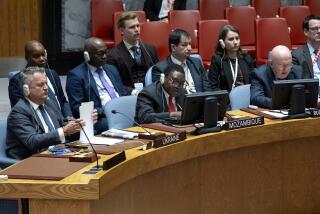Libyan Wrong for U.N. Job
- Share via
It sounds like a punch line but unfortunately it isn’t. As of today, Najat Hajjaji, who represents Moammar Kadafi’s Libya, is chairwoman of the United Nations Human Rights Commission.
What makes this possible is the U.N. regional rotation system for leadership of the commission that leaves the choice purely to nations in each region.
Last year it was Europe’s turn, and its delegates to the commission unremarkably chose Poland. This year, African members chose Libya.
Perhaps Libya’s contact with the U.N. body will improve human rights for Libyans. But in the future, the United Nations should add a requirement that the commission leader’s nation possess a decent record of respecting human rights. A rotation system is not necessarily bad, but it is insufficient.
Kadafi, who prefers to be known as “the Brotherly Leader and Guide of the Revolution,” has ruthlessly ruled Libya since 1969. The country’s political system is based on a book written by Kadafi that explicitly rejects parliamentary democracy and political parties.
Even if “Libya has taken significant steps to mend its international image,” as the latest State Department report on Libya states, the country isn’t qualified to monitor human rights abuses worldwide.
The United Nations itself in the mid-1990s accused Libyan security forces of executing people considered opponents of the regime. Just last year, Libyan courts were ordering amputations as punishment for such crimes as robbery.
It was only two years ago that a Scottish appeals court upheld the life sentence of a Libyan agent found guilty of placing a bomb aboard a Pan Am plane that crashed over Lockerbie, Scotland, in 1988, killing 270 people.
This month, 86 Libyans accused of Islamic extremism in Libya face a retrial after a first court handed down two death sentences and scores of life sentences. The accused are professionals and university students charged with belonging to an Islamic group that Amnesty International says does not advocate violence.
Even though her colleagues praise her intelligence and professionalism, Hajjaji is the wrong person for the job because she represents a country whose record on human rights is seriously flawed. The United Nations owes it to the commission’s other members to reassess its method of choosing leaders.
More to Read
Sign up for Essential California
The most important California stories and recommendations in your inbox every morning.
You may occasionally receive promotional content from the Los Angeles Times.











